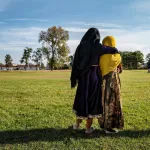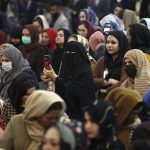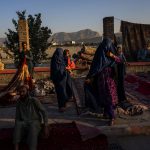The Afghans’ first few weeks on U.S. military bases were a blur. In Virginia, Shami and her daughter met distraught women who were forced to leave their own children behind. In New Mexico, Freshta Ahrar’s mother struggled to navigate their new surroundings in a wheelchair. And in Wisconsin, at Fort McCoy, some Afghan women didn’t know who to talk to about undergarments that they didn’t want.
Fort McCoy, which housed nearly 13,000 refugees, resettled its last Afghan families this week, narrowly meeting the Biden administration’s mid-February deadline to resettle all of the refugees into new communities.
By the end of the Afghans’ stay, Fort McCoy’s supply operation was a well-oiled machine: Refugees boarded a bus to get to the warehouse on the other side of the 60,000-acre military base. Blankets, jackets, closed-toe shoes, hygiene products and undergarments were stacked high.
But it hadn’t always been as streamlined.
Deb Lamere, a 47-year-old Army veteran and disaster response volunteer, noticed early in her rotation at the refugee operation that a bin of sports bras seemed to remain largely untouched. She set out to ask why.
“When I first started assessing the room and started talking to our Afghan female interpreters that were helping run the women’s side, I started building relationships,” Lamere said. “And after a couple of days I asked them: ‘What do you really need?’”
The interpreters informed her that many of the Afghan women were too shy to spend time looking through the intimates in front of men, and on top of that, would have preferred alternative undergarments. As one of the few women on the floor, Lamere found a way to discreetly pass this information up the chain of command.
A sheet was promptly hung to provide privacy, and the browsing women spent more time sifting through the clothing. It was “like a feeding frenzy,” Lamere said, noting that when one older woman found the undergarments she was looking for, she “motioned to her body, happily, and gave me a hug.”
With food, clothing and shelter taken care of, Lamere said the next need was figuring out how to translate skills into jobs. Many created resumes and searched online for job postings. Mothers looked for child care and quality education. Others signed up for language and culture courses, including professional development and driving lessons. In general, Lamere saw a desperate need for a support network, a community to help the refugees feel less helpless and alone.
The closing of Fort McCoy’s resettlement operations means only Joint Base McGuire-Dix-Lakehurst in New Jersey continues to house refugees. They are the last of more than 76,000 Afghans — more than half of which were women and children — to temporarily stay in eight military bases across the country.
“I am incredibly proud of the important work our service members along with their interagency partners at Task Force McCoy have done over the last five months,” Gen. Glen VanHerck, the commander of U.S. Northern Command, who oversaw resettlement efforts nationwide, said in a statement.
Officials with the Department of Defense connected The 19th with several Afghan women in the midst of resettling in the United States. These women described harrowing journeys, family separation and concerns about their future lives in America.
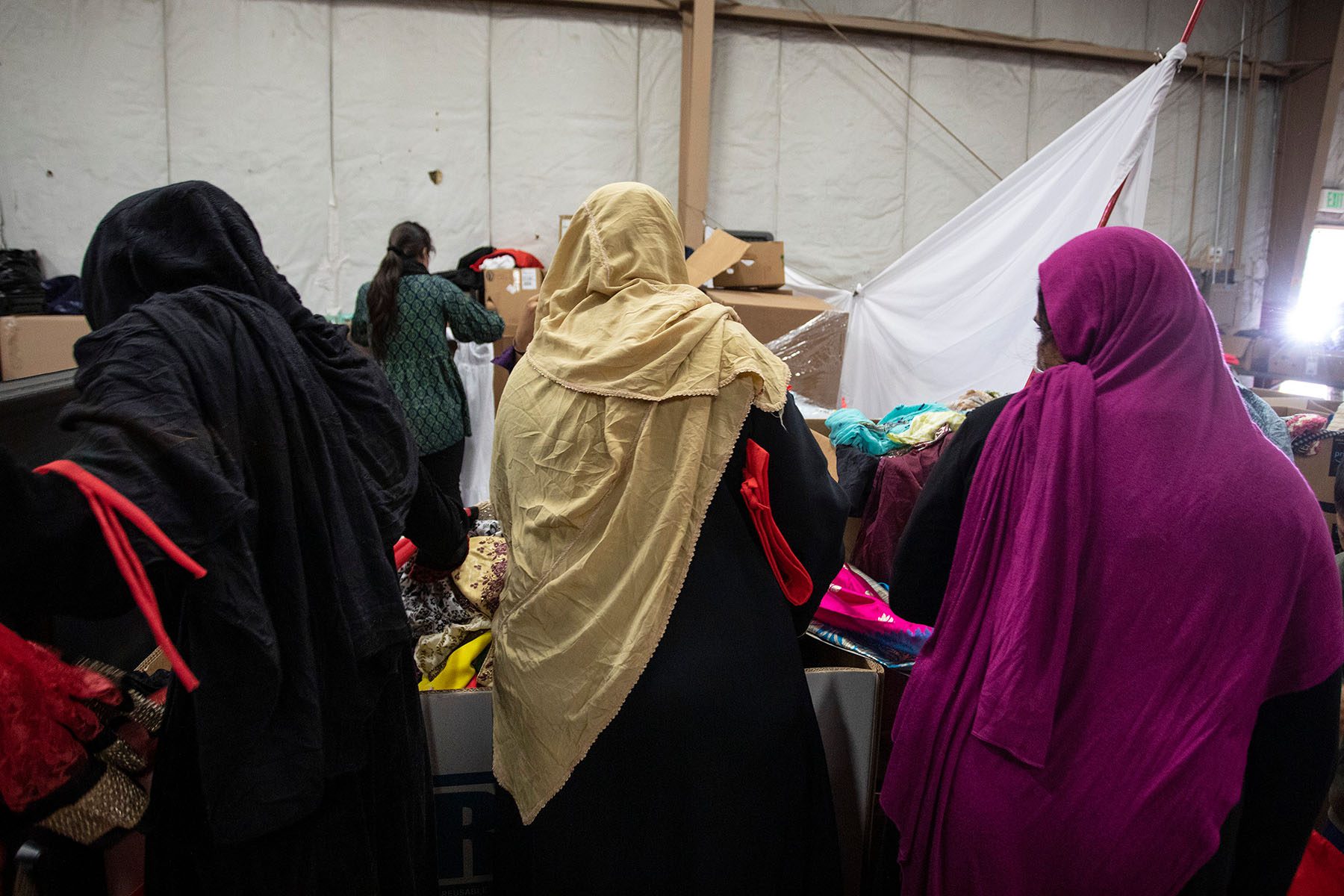
Shami, a 32-year-old Afghan refugee, arrived in Dallas at the end of August with her husband, daughter, niece and husband’s cousin. She heard clapping and saw the smiling faces of resettlement agency workers, but recalled feeling “happy and unhappy at the same time.”
It had been an arduous trek, made possible through a contact in the United States with ties to the Army.
“I sent him all the documents, and he helped us with getting into the airport,” said Shami, who requested to use only her first name while her immigration documents were being processed and for the safety of her family in Afghanistan. “You had to go through the Taliban and the Afghanistan National Force, and he passed information to the U.S. soldiers at the gate. We had to go three or four times to the airport before someone in the U.S. Army [who knew our contact] finally called our name.”
She narrowly escaped on one of the last American evacuation planes, just before an explosive device detonated and killed about 170 Afghans and 13 U.S. service members at the Kabul airport.
Her mother, father-in-law and mother-in-law were left behind.
After arriving in Dallas, Shami and her family were transported to the Marine Corps base in Quantico, Virginia. She saw many distraught women, some mothers who lost children or were forced to leave some of their children behind in Afghanistan. Others were marveling at “luxuries” they had never seen before in their villages, like a flushing toilet, Shami said. There were also U.S. workers organizing classes on cultural competency, language and driving.
But many families were still adjusting.
“Most of the women are not allowed to leave the place where they sleep,” Shami said of the families she met on base in Virginia. “The men do not feel comfortable letting their women outside by themselves. Husbands grab food from the cafeteria … That mindset might take time to adapt.”
Shami spoke with The 19th shortly before the Quantico base announced the departure of its last Afghan refugees on December 23. Looking forward, she said, her focus is on finances and education: obtaining proper employment authorization, completing her master’s degree and setting her 16-year-old daughter on the path to college.
In Afghanistan, Shami had worked to help area businesses through a project run by the U.S. Defense Department. The savings from that job and what money her family had set aside are now inaccessible to them, held at a bank in Afghanistan.
“We built a very beautiful home, still in construction,” she said. “We were not able to enjoy what we had built for ourselves. You leave everything behind, even your dreams. I was always thinking of having an IT company to help Afghan women in technology — I had to leave that behind.”
Building a new life, she said, “is not something simple, especially for people with families who work hard to earn a happy life.”
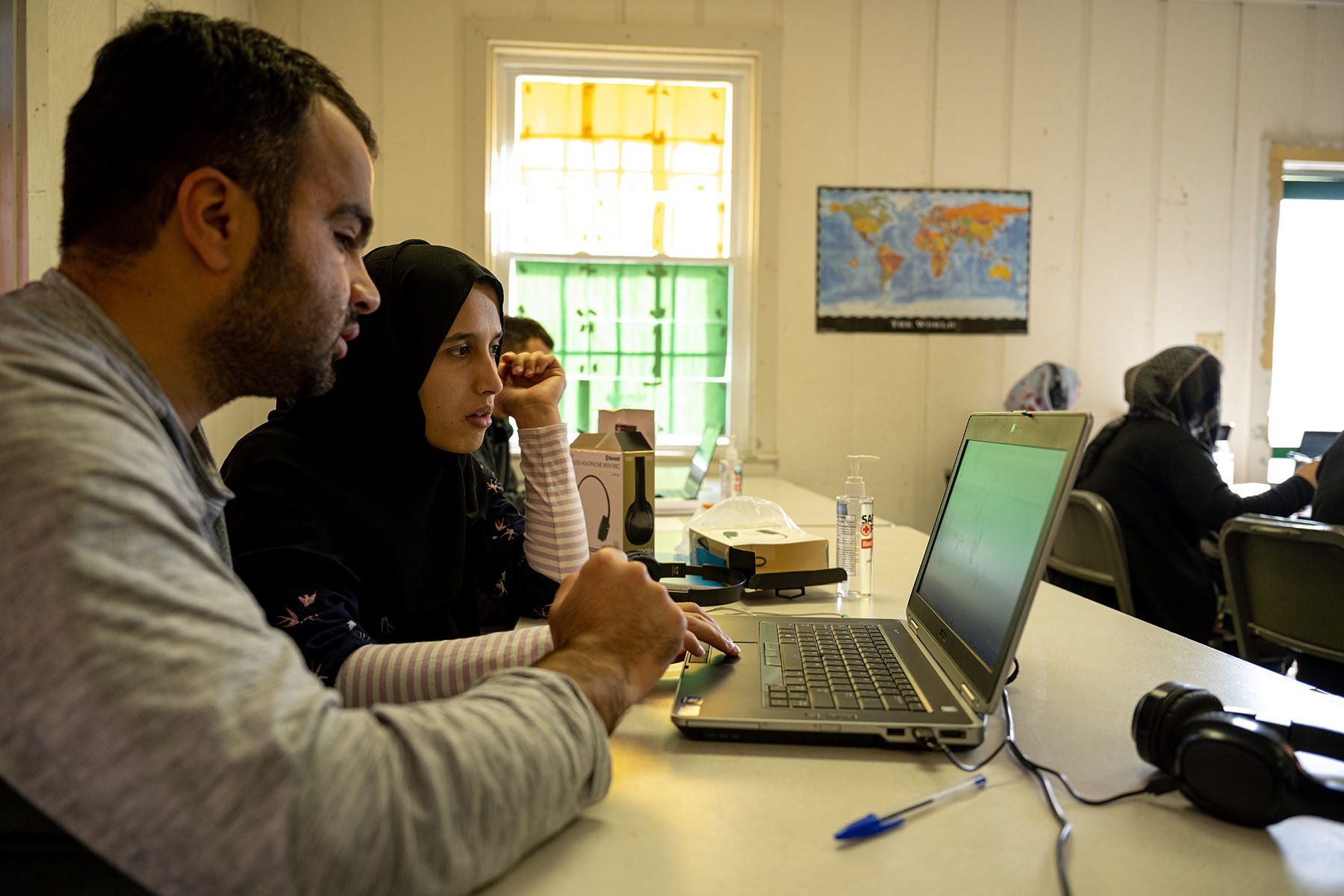
Ahrar, a 29-year-old UNICEF worker, arrived in the United States last October after a dangerous weeks-long journey from Kabul to the Holloman Air Force base in New Mexico. In Afghanistan, she worked for nearly two years as a social policy specialist — a position that required she return to Kabul if she wanted to keep it.
Anxiously waiting to see if she could get work authorization in time to find a job that would allow her to reside in the United States, Ahrar said she didn’t know when she would be reunited with her husband or if the months of savings she had would be enough to support her family.
The Taliban took over Kabul while her husband was in Italy renewing a residency permit for his job. Ahrar only had a few hours to pack a backpack and grab her parents, her brother, her sister and her brother-in-law. Outside the airport in Kabul, there were thousands of panicked Afghans running and a group of Taliban fighters shooting their weapons into the sky. The family was forced to kneel — except for Ahrar’s mother, who stayed in her wheelchair — for more than 12 hours through the night. Once inside, they waited in line for four days without food, water or shelter from the sweltering sun. Finally, they squeezed onto a plane alongside about 500 others and headed for Abu Dhabi, where they stayed for more than 50 days, delayed by COVID-19 quarantine protocols.
The family did not stay for long at the New Mexico base. Ahrar’s mother, a retired engineer who has severe inflammation in her knees and spinal cord, often struggled to make the 10-minute trip between the family’s tent and the restrooms multiple times each day. Less than three weeks after they arrived, she fell from some stairs. The family was granted an early departure from the base after that accident, and a friend helped them book tickets to California, rent an apartment there and enroll in English language courses.
The Air Force base announced the departure of its last refugee on January 26.
“The first thing I noticed is it’s very much calm and quiet here,” Ahrar said from her new home. “You rarely see people other than on weekends, but where I came from you’d see people everywhere every day — crowded. This might make my parents feel homesick.”
Ahrar said she had never wanted to leave her country permanently but knew if she were to have children one day, they’d need security. And while she is grateful to be safe, the stress and uncertainty weigh on her.
“Emotionally and mentally, I’m trying to control myself using all those techniques that I’ve learned to keep myself totally normal,” Ahrar said. “There are five to six people whose lives are dependent on me, and it’s very hard. If you feel that you’re also going through bad times and trauma, you have to appear very strong for the rest of the family members.”




